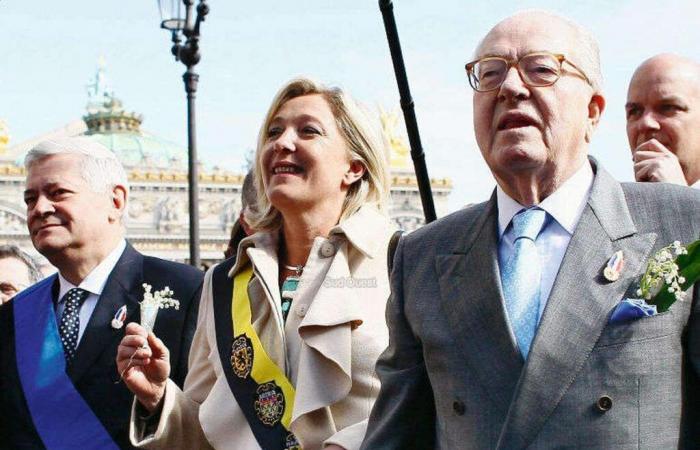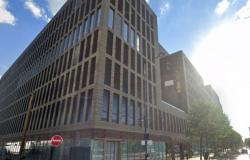
Jean-Marie Le Pen died this Tuesday, January 7 at the age of 96. He gradually withdrew from political life after a very long career during which he played more the role of tribune than that of a true aspirant to power. Agitator, provocateur, resurrecting at the dawn of the 70s and 80s an extreme right that was believed to be moribund since the dark hours of the Collaboration, he was a figure as incontestable as he was controversial at the end of the 20th century and the beginning of the 21st century.
Born on June 20, 1928, this only son of a fisherman from Trinité sur Mer and a seamstress became an orphan at a very young age: his father jumped in August 1942 on a mine brought up from his trawl, which brought young Jean -Marie hastily introduced himself as the son of a hero of the Second World War… After studying law in Paris, he enlisted in the army to go to Indochina as a second lieutenant in the paratroopers of the Foreign Legion.
The National Front in 1972
In 1956, he was elected deputy for Paris thanks to the Poujadist wave (named after the populist leader at the time, Pierre Poujade). He requested leave and left the National Assembly for six months to return to his former battalion which landed on the Suez Canal, then in Algeria. It is there that he will be accused of torture, an accusation he has always denied: if Le Pen admits to having defended the “legitimate use” of torture, he denies having practiced it. In any case, his participation in the fighting in Algeria earned him the Cross of Military Valor by General Massu.
Bringing together all the far-right groups and allegiances, “that has always been my obsession”
The Fifth Republic succeeded the Fourth, General de Gaulle (of whom Jean-Marie Le Pen will always be one of the most virulent opponents) returned to power, but the young para (he is only 31 years old) is re-elect deputy (CNIP) of Paris. His participation in an OAS meeting in 1961 led to his being questioned by the police. Defeated in the 1962 legislative elections, Le Pen became the following year the campaign director of Jean-Louis Tixier-Vignancour, a famous far-right lawyer who was preparing to run two years later in the first presidential election by suffrage. universal.
During the summer of 65, he organized the “TV caravan” (like Tixier-Vignancour) which traveled the beaches. “It gave me,” he said, “the experience of organizing a political movement.” However, the two men broke up once the election was over: Le Pen criticized his mentor for his “moderation”. He will now, and forever, be his own boss.
Firstly that of the record publishing house that he launched under the name “Histoire et documentation”, where in fact the songs of the former Waffen SS are nestled. Then, and above all, that of the party he created in 1972: the National Front. With the FN, Le Pen is trying to bring together all the far-right groups and allegiances, including Pétainists, fundamentalist Catholics and those nostalgic for French Algeria. “It’s always been my obsession,” he confessed.
35 deputies in 1986
A first candidacy for the presidential election, in 1974, allowed him to make himself known, but he only received 0.74% of the votes and began a journey through the desert which lasted almost ten years. In 1981, he did not even obtain the 500 sponsorships that became necessary to run in the presidential election. He settled in the opulent villa of Montretout, in Saint-Cloud, which he inherited under controversial conditions from the cement manufacturer Hubert Lambert, who died in 1976. This inheritance comes at the right time, since the apartment in the 15th arrondissement of Paris where he lived the Le Pen family was blown away by a bomb attack, claimed by an “antifa committee” and which, fortunately, caused no casualties.
Does Le Pen want to keep away from him the chalice of power that deep down he fears? Or is he really saying what he thinks out loud?
In the municipal elections of 1983, it was the beginning of an irresistible rise. Le Pen obtained 11.3% of the votes in the 20th arrondissement of Paris. In Dreux, the local right allied itself with its first lieutenant Jean-Pierre Stirbois. The president of the FN was invited on the flagship political program of the time, “L’Heure de Vérité”. Members are flocking. In the European elections of June 1984, the FN list received 11% of the votes, more than that of the Communist Party!
This is the moment when the party develops the thesis of “national preference” in order to put an end to “immigration pumps”. The proportional representation of 1986, desired by François Mitterrand, allowed the FN to have for the first time a group in the National Assembly: 35 deputies, some of whom ended up leaving, like so many others later, the party having been regularly subject to exclusions and splits, the most resounding in 1999 with number 2 Bruno Mégret who created a new party and took with him a majority of executives. But Le Pen will emerge victorious from this “puputsch”.
Excluded from his party
It is also the time of slip-ups: “Durafour crematorium”, the gas chambers “point of detail of History”… Does Le Pen want to keep away from him the chalice of power that deep down he fears? Or is he really saying what he thinks out loud? In the 1988 presidential election, he again caused a sensation by obtaining 14.4% of the vote. From one presidential election to another, he grabbed a point, up to 16.2% which allowed him to reach the second round on April 21, 2002. However, we feel him helpless in the face of this success of which he seems not to know. what to do. “I wasn’t prepared,” he admits. I am not maneuverable enough to come to power, not smart enough.”
The opportunity will not present itself again. Five years later, Nicolas Sarkozy managed to “siphon” votes from the FN and Le Pen fell to 10.4%. In 2011, at the age of 83, he handed over the presidency of the party to his third daughter, Marine. This will never stop “de-demonizing” the FN to the point of changing its name, while “Le Menhir” seems to take great pleasure in multiplying provocations. In 2015, he was even excluded from the party he created and of which he remained “honorary president”. He nevertheless supported his daughter in the 2022 presidential election, despite his sympathy for Eric Zemmour. For the Le Pens, family and politics remain indissolubly linked.





